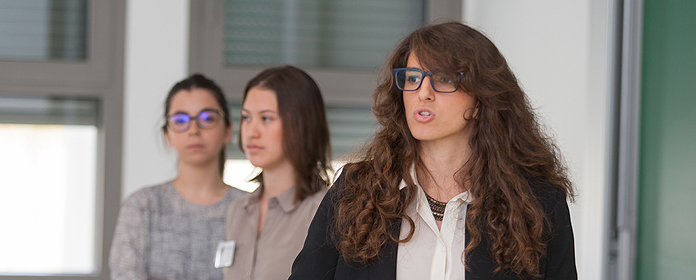In Navarre more than 1,000 women "could be at risk of suffering female genital mutilation".
'Interculturalism and women's rights', awarded at the congress FORUN 2017.

"In Navarra there could be around 1,185 women at risk of female genital mutilation, but there is no protocol to know the number of people who may be at risk of forced marriage," laments Isabella Dalmau, a student of the Double Degree in Law and Philosophy of the University of Navarra.
Amparo Campos, Celeste Macedo and Isabella Dalmau obtained the second award in modality written from congress FORUN with their work 'Interculturalism and women's rights'. In it, they address two cultural practices practiced in the Foral Community: female genital mutilation and forced marriages.
The present calls for action," warns Amparo Campos. We cannot put a blindfold on our eyes simply because they are cultural practices rooted in other countries. Women's rights are being violated and it is a struggle for everyone, it does not understand borders".
"Cultures must enrich each other and we can do so by striving to stop these practices from being commonplace," agreed Celeste Macedo, who explains that it is important to raise awareness, sensitization and the Education, so real in "a world on the move," topic of the seventh edition of congress.
In the work of research, directed by Mª Cruz Díaz de Terán, professor at the School Law School, the practices of a culture that may collide with the known rights of the places where the emigrants settle down are addressed.
Female genital mutilation in NavarraIsabella Dalmau says that, as confirmed by data of the NGO Doctors of the World in Navarra, more than 250 women in the region have suffered female genital mutilation, a internship which consists of the total or partial removal of the external genital organs.
This form of violence is often perpetrated, the law students and Philosophy recall, on short trips to their countries of origin, "often during vacations". The World Health Organization (WHO) reveals in its most recent programs of study that in Spain around 17,000 young people are at risk.
Forced marriagesRegarding forced marriages, they denounce that "there is no established system to define how many women are at risk". Celeste Macedo stresses that it is "a real need to develop a protocol to prevent them".
Even more so, he adds, in the face of the refugee crisis: "Aldeas Infantiles warned of the growing and alarming issue cases of marriages that were occurring and countries such as Sweden and Germany have declared that they will not recognize them all".
"We hope that Spain will take a decision on the matter," says Isabella Dalmau. This precaution is due, they explain, to the fact that most marriages are arranged to secure assets within the family, to protect their daughters in refugee camps, or to ensure them a better future.
The work 'Interculturalism and women's rights' is part of the line of research of programs of study on Women (Genovifem), belonging to group of research in Recent History (GIHRE).
